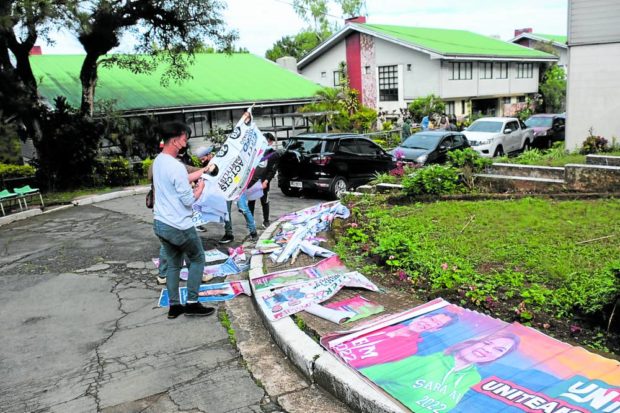
TAKEN DOWN | Campaign posters dismantled by members of the government’s “Oplan Baklas” team in a Feb. 19. 2022, operation are collected at the Commission on Elections’ compound in Baguio City. (Photo by NEIL CLARK ONGCHANGCO)
BAGUIO CITY, Benguet, Philippines — A Regional Trial Court (RTC) judge here on Monday stopped the Commission on Elections (Comelec) from enforcing a resolution that required volunteers and supporters of political candidates to get a permit for all of their campaign activities.
The 72-hour temporary restraining order (TRO) issued by Judge Maria Ligaya Itliong Rivera was based on a lawsuit filed by groups backing Vice President Leni Robredo’s presidential bid, to determine their rights under Comelec Resolution No. 10732.
The resolution sets the rules for poll-related activities amid the COVID-19 pandemic.
In her two-page order, Rivera granted the petition for a TRO as the petitioners would suffer “grave and irreparable injury” to their rights of freedom of expression and assembly.
Lawyer Karina Gay Balajadia Liggayu, one of the petitioners, said they filed a petition for declaratory relief on the same day the TRO was issued to determine if the poll body’s rules also covered volunteers without direct ties to any official campaign or political party, and were not under the supervision of candidates.
Among the complainants was a minor, the son of petitioners Joseph and Maarin Cabato, to represent the “future generation” who may be impacted by the Comelec requirements, Liggayu told the Inquirer in a phone interview.
The boy “[wanted] to volunteer for something he believes in” and should not be restrained by the poll body, she said.
Liggayu, the Cabatos, and five other petitioners also sought an injunction and the nullification of the Comelec campaign rules. They directed their petition to the poll body’s Manila and Baguio offices.
Connected by analogy
The judge was expected to schedule a hearing this week on the request for a 20-day preliminary injunction while the court resolves the issues raised by the One Baguio Benguet-Robredo People’s Council (OBB-RPC) and 10 affiliate groups like the Baguio Benguet Lawyers-Volunteers for Leni.
The groups are composed of hundreds of volunteer campaigners “who print their own tarpaulins, organize neighborhood campaign drives, and campaign house-to-house,” said Liggayu, an OBB-RPC coordinator.
The lawsuit stemmed from a Feb. 16 letter from the Comelec Cordillera office, which stated that volunteers were part of the official campaign “by analogy.”
Liggayu said this meant that every activity in support of their candidate would need a permit from the poll body even after they had already met the requirements set by the city government.
The petitioners argued that they were not covered by the permit requirement under the Comelec resolution because they were merely volunteers.
“We only have 70 days in the campaign and for them to curtail us at this point… it is already an urgent matter,” Liggayu said.
She added that their case “[was] not just for us…. It can be the basis for protection of all volunteers supporting any candidate.”
The poll body also implied that expenditures of volunteers could be scrutinized to determine if they exceeded the expense limits set for candidates, Liggayu said.
She added that it would be difficult to track their spending because in many instances, posters and tarpaulins for the Robredo campaign came from anonymous donors.
This was not the first time the Vice President’s supporters had pushed back against seemingly overrestrictive requirements set by the Comelec. Earlier, the poll body took down oversized tarpaulins, including those of Robredo and her running mate, Sen. Francis Pangilinan, even though these were posted on private property.
Last week, veteran election lawyer Romulo Macalintal also asked the poll body to review its resolution on election materials, particularly those put up by volunteers on private property.
RELATED STORY
IBP: Comelec can’t apply rules to noncandidates
Comelec eyes review of campaign rules